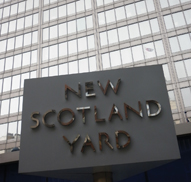There’s significant under-recording of crime, according to an interim report on crime data integrity by Her Majesty’s Inspectorate of Constabulary (HMIC). The inspectorate says that it has identified serious concerns about the crime-recording process. HMIC has found weak or absent management and supervision of crime-recording, significant under-recording of crime, serious sexual offences not being recorded, and some offenders having been issued with out-of-court disposals when their offending history could not justify it.
HM Chief Inspector of Constabulary, Tom Winsor, said: “The accuracy and integrity of police-recorded crime data are vital to public trust in the police. The HOCR and NCRS are not optional – every police officer should be able to understand and properly apply them, and every police force should adhere to them.
“The consequences of under-recording of crime are serious, and may mean victims and the community are failed because crimes are not investigated, the levels of crime will be wrongly under-stated, and police chiefs will lack the information they need to make sound decisions on the deployment of their resources.
“Although this is an interim report, and we have identified common strengths, we are seriously concerned at the picture which is emerging – particularly about the significant under-recording of crime, and serious sexual offences not being recorded.
“This is an inspection of the integrity of police-recorded crime data – not an inspection or inquiry into the integrity of the police. HMIC will inspect the remaining forces in England and Wales to provide a full picture of crime data integrity, with the final report published in October 2014.”
HMIC’s inspection of crime data integrity intends to identify to what extent police-recorded crime information can be trusted. The interim report is based on inspections carried out in 13 police forces, and sets out the emerging themes so far. This inspection – which looks at how the Home Office Counting Rules (HOCR) and National Crime Recording Standard (NCRS) are applied – has identified serious concerns in the emerging picture. HMIC says that it has found:
Weak or absent management and supervision of crime-recording.
Significant under-recording of crime.
Serious sexual offences not being recorded – HMIC identified 14 rapes not recorded.
A lack of victim focus by the police when making crime-recording decisions.
Some offenders having been issued with out-of-court disposals when their offending history could not justify it, and in some cases they should have been prosecuted.
HMIC highlights that if the findings for the first set of forces are representative across all forces and all crime types, this implies that 20 percent of crimes may be going unrecorded. Some forces have performed better than others.
The report sets out a number of reasons for these concerns, such as poor knowledge of the recording rules, inadequate or absent training in how to use them, poor supervision or management of police officers and the pressure of workload – where police officers have been managed in such a way as to overload them with cases.
The inspection has also identified strengths which are common to all of the forces visited so far:
When crime reports are recorded, the classification of the offence which is recorded is correct on almost every occasion.
By listening to calls made to the police, HMIC is finding that victims of crime receive a professional service with call-takers being polite, helpful and showing empathy to the needs of the victim during initial contact with the police.
As well as the emerging themes from the first 13 forces, today’s interim report sets out HMIC’s full methodology for this inspection, which has been developed in consultation with other organisations.
The 81-page interim report covers 13 of the 43 Home Office police forces. The report emphasises that the only statistically significant finding is the national one, and that will be available in the final report in October. This report contains emerging themes, not final conclusions.
The forces inspected so far are:
Cheshire Constabulary
City of London Police
Devon and Cornwall Police
Essex Police
Gloucestershire Constabulary
Greater Manchester Police
Gwent Police
Hertfordshire Constabulary
Metropolitan Police
Norfolk Constabulary
North Wales Police
North Yorkshire Police
South Yorkshire Police.
For the report visit the HMIC website.
ACPO view
Speaking for the Association of Chief Police Officers (ACPO), National Police Lead for Crime Statistics, Gwent Chief Constable Jeff Farrar said: “Her Majesty’s Chief Inspector of Constabulary’s (HMIC) interim report on crime data integrity highlights both strengths and weakness in the 13 forces of 43 that have been inspected.
“There’s more to do to raise standards and get consistency across the country but it’s important to recognise that in many of the cases identified by HMIC as failing to comply with the Home Office Counting Rules there’s clear evidence that the public have still received an appropriate and responsive service.
“While the report identifies that the Home Office Counting Rules are not especially complicated, they can be interpreted by forces in different ways. We are working hard to rectify this through training and accreditation of force crime registrars led by the College of Policing.
“The vast majority of officers join the police motivated by a desire to protect the public; nobody joins the police service with the intention of recording crime inaccurately. However, it is clear that the service has not always met the standards of data quality that the public expects.
“The service is already actively addressing many of the weaknesses identified by the report: we’re reviewing the way we record sexual offences across the country and we’re working with the College to implement the Code of Ethics, which highlights the need for ethical recording. ACPO have already recognised issues with the out of court disposal framework and are currently working with government and other partners, including HMIC, on a review of the system. We are also working with the Home Office, HMIC, the Office of National Statistics (ONS) and the Crime Statistics Advisory Committee (CSAC) to regain the national statistics designation and ensure that the public have confidence in the police.”










